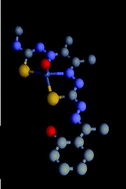The exocyclic functionalisation of bis(thiosemicarbazonate) complexes of zinc and copper: the synthesis of monomeric and dimeric species†‡
Abstract
This paper reports the synthesis of bimetallic zinc thiosemicarbazone complexes with rigid aromatic linkers, using either 1,3- or 1,4- benzenediamines or 1,3- or 1,4- benzenedialdehydes as the basis of the linking groups. Non-rigid aliphatic diamines and dialdehydes were also used to link the zinc chelating units. Reaction of a bis(thiosemicarbazone) with a pendant NHNH2 group with monoaldehydes or ketones gives a range of monomeric complexes with exocylic imine groups bearing a range of substituents. The zinc complexes can be quantitatively and rapidly transmetallated to the corresponding copper complexes and this route or direct reaction with the free ligand can be used to radiolabel the monomeric species with 64Cu. In vivo and in vitro studies of one of the 64Cu imine complexes shows substantial hypoxic selectivity and high tumour uptake in a murine model.

- This article is part of the themed collection: Dalton Discussion 10: Applications of metals in medicine and healthcare

 Please wait while we load your content...
Please wait while we load your content...